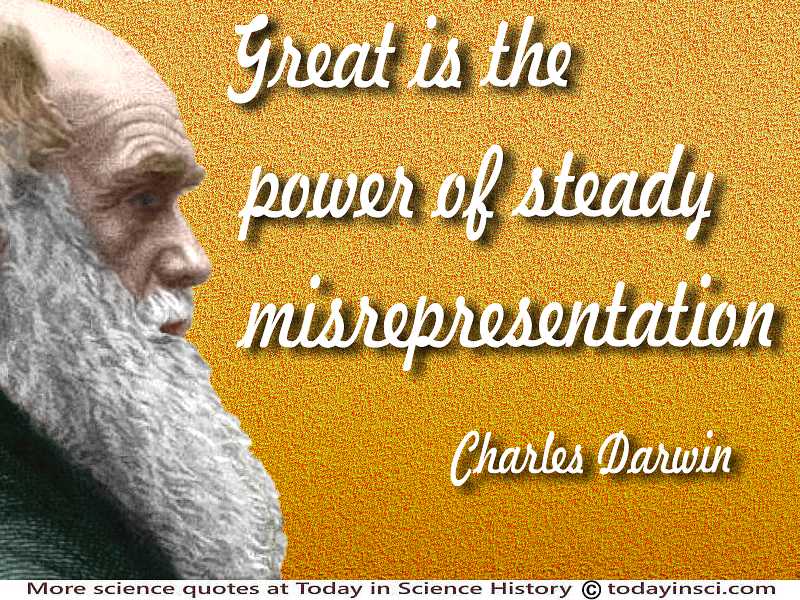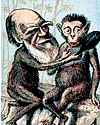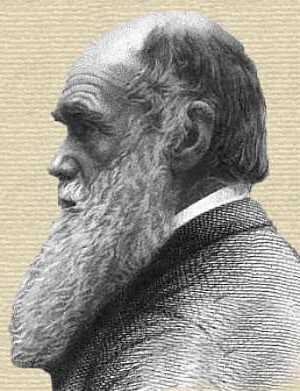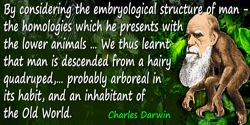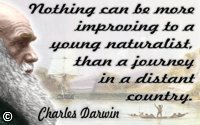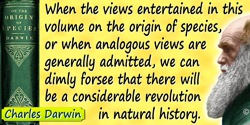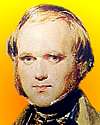 (source)
(source)
|
Charles Darwin
(12 Feb 1809 - 19 Apr 1882)
English naturalist who presented facts to support his theory of the mode of evolution whereby favourable variations would survive which he called 'Natural Selection' or 'Survival of the Fittest.'
|
Charles Darwin Quote
“Great is the power of steady misrepresentation”
Illustrated Quote - Large (800 x 600 px)
More Charles Darwin quotes on science >>
Context of Charles Darwin's quote on “the power of steady misrepresentation.”
In Charles Darwin's famous book The Origin of Species, his last chapter is a long recapitulation and then his conclusion. After it was published in 1859 (bold text), and controversy ensued, these pages were editted in each subsequent editions to add clarification. In the text below, most was added (normal text) in various revisions since the first edition. By the sixth British edition (1872), Darwin addressed the misrepresentations that were circulating of his ideas, and begins the conclusion with remarks to amplify that he believes in the modification of species through time by natural selection, but not exclusively so, thus:
“I have now recapitulated the facts and considerations which have thoroughly convinced me that species have been modified, during a long course of descent. This has been effected chiefly through the natural selection of numerous successive, slight, favourable variations; aided in an important manner by the inherited effects of the use and disuse of parts; and in an unimportant manner, that is in relation to adaptive structures, whether past or present, by the direct action of external conditions, and by variations which seem to us in our ignorance to arise spontaneously. It appears that I formerly underrated the frequency and value of these latter forms of variation, as leading to permanent modifications of structure independently of natural selection. But as my conclusions have lately been much misrepresented, and it has been stated that I attribute the modification of species exclusively to natural selection, I may be permitted to remark that in the first edition of this work, and subsequently, I placed in a most conspicuous position—namely, at the close of the Introduction—the following words: ‘I am convinced that natural selection has been the main but not the exclusive means of modification.’ This has been of no avail. Great is the power of steady misrepresentation; but the history of science shows that fortunately this power does not long endure.
It can hardly be supposed that a false theory would explain, in so satisfactory a manner as does the theory of natural selection, the several large classes of facts above specified. It has recently been objected that this is an unsafe method of arguing; but it is a method used in judging of the common events of life, and has often been used by the greatest natural philosophers. The undulatory theory of light has thus been arrived at; and the belief in the revolution of the earth on its own axis was until lately supported by hardly any direct evidence. It is no valid objection that science as yet throws no light on the far higher problem of the essence or origin of life. Who can explain what is the essence of the attraction of gravity? No one now objects to following out the results consequent on this unknown element of attraction; notwithstanding that Leibnitz formerly accused Newton of introducing ‘occult qualities and miracles into philosophy.’
I see no good reason why the views given in this volume should shock the religious feelings of any one. It is satisfactory, as showing how transient such impressions are, to remember that the greatest discovery ever made by man, namely, the law of the attraction of gravity, was also attacked by Leibnitz, ‘as subversive of natural, and inferentially of revealed, religion.’ A celebrated author and divine has written to me that ‘he has gradually learnt to see that
it is just as noble a conception of the Deity to believe that He created a few original forms capable of self development into other and needful forms, as to believe that He required a fresh act of creation to supply the voids caused by the action of His laws.’”
Thus, as he added in 1872, Darwin believed the power of misrepresentation does not long endure in science. One can wonder how he would react if he came back to our time, so much more than a century since he expressed that remark, and observed the unremitting, perfidious efforts of creationists to inject their religious interpretation into the teaching in science classrooms. Once rebuffed, the creationists returned in the fabled emperor's transparent new clothes to preach the so-called “intelligent design.” Yet, as seen above, Darwin from his first edition, provides the eloquent words from a clergyman in his own time, expressing that belief in evolution remains faithful to a belief in the Creator.
Darwin continues laying out in the conclusion his rebuttal of the objections raised in his own time. They still reverberate to the present day. Then and now, asked and answered. Again and again. The modern expression applies to those who reject the theory of evolution: “Don't confuse me with the facts, my mind is made up.” Darwin was optimistic when he elegantly expressed the same idea in his own words as:
“The day will come when this will be given as a curious illustration of the blindness of preconceived opinion.”
Sadly, we are now faced with too many politicians, energy moguls and biassed media puppets who present the same attitude of preconceived opinion towards climate change, for which time is running out—and the stakes are much higher—to accept and act upon the scientific facts. As we see so painfully in our own era, great is the power of steady misrepresentation.
More quotes on | Endure | Evolution | History of Science | Opinion | Truth |
- Science Quotes by Charles Darwin.
- 12 Feb - short biography, births, deaths and events on date of Darwin's birth.
- Charles Darwin - Earthquake observation on 20 Feb 1835, during the voyage of the Beagle.
- Charles Darwin - context of quote “If the misery of our poor be caused not by the laws of nature…” - Medium image (500 x 350 px)
- Charles Darwin - context of quote “If the misery of our poor be caused not by the laws of nature…” - Large image (800 x 600 px)
- Charles Darwin - context of quote “Improving…a young naturalist” - Medium image (500 x 350 px)
- Charles Darwin - context of quote “Improving…a young naturalist” - Large image (800 x 600 px)
- Charles Darwin - context of quote “Great is the power of steady misrepresentation” - Medium image (500 x 350 px)
- Charles Darwin - context of quote “This…I call Natural Selection, or the Survival of the Fittest” - Medium image (500 x 350 px)
- Charles Darwin - context of quote “This…I call Natural Selection, or the Survival of the Fittest” - Large image (800 x 600 px)
- Letter to Asa Gray - from Charles Darwin (5 Sep 1857).
- From So Simple a Beginning: Darwin's Four Great Books, by Charles Darwin, Edward O. Wilson. - book suggestion.
- Booklist for Charles Darwin.
